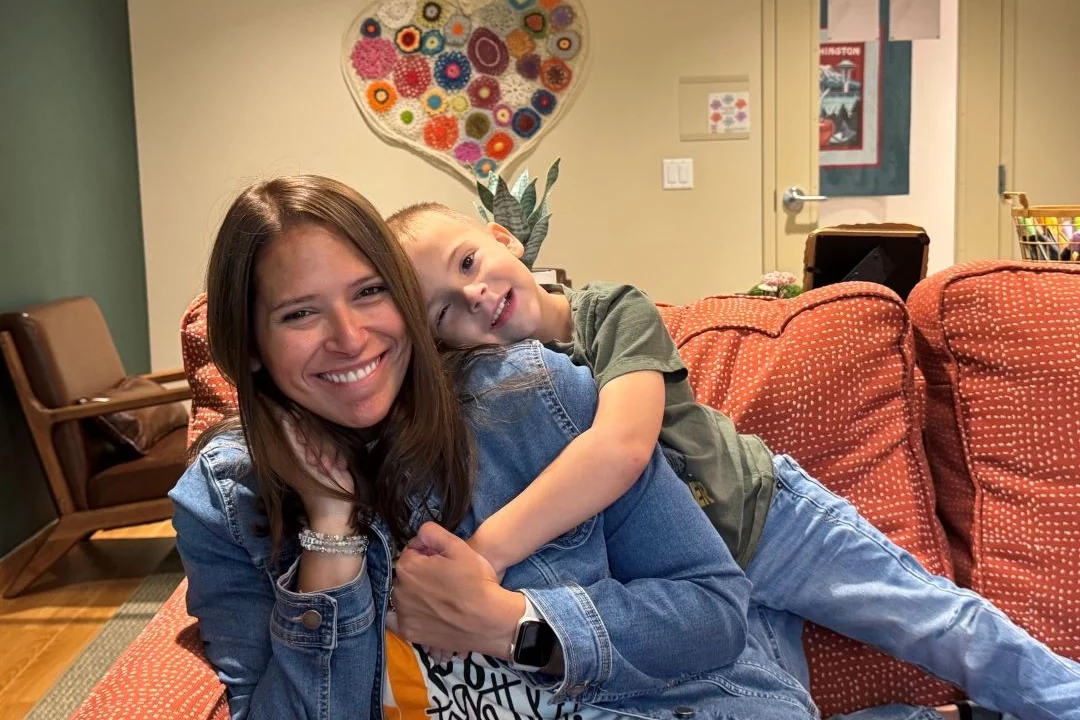
When Mark (aka Marky) Brandt was just two weeks old, his family learned he had a rare hereditary eye cancer called retinoblastoma. His dad, Mark Sr., had faced the same diagnosis as a child, so they knew what was ahead. But nothing could fully prepare them for the journey.
Now 4 years old, Marky has spent much of his life in treatment, from chemotherapy to radiation to clinical trials. From February 2023 to May 2025, Tamara and Marky lived at the Seattle Ronald McDonald House off and on, sometimes for four months at a time. Even after their care transitioned to Oregon, they return to Seattle for treatment, and to the House that has become a second home.
Living at the House transformed Tamara’s experience. For the first time, she didn’t have to navigate hospital stays alone.
“I had always lived in hotels during treatment, eating granola bars and trying to manage alone,” she remembers. “When we walked into House C, I had a kitchen, a living room, my own bathroom—and food. It was amazing. We call it our Ronald McDonald ‘home’ because that’s what it became.”
At the House, she and Marky found more than a place to stay; they found family. Other parents became friends who understood the hardest days. Volunteers and staff stepped in with compassion that made the impossible feel manageable.
“One of the hardest parts is leaving,” Tamara says. “All of the kids here feel like my babies. When I go back to Oregon, I feel like I’m leaving my babies behind.”
Marky, despite being sick much of his young life, brought joy to the community too. He often convinced other children to play “zombies” in the hallways. Birthdays, holidays, and simple evenings watching movies together became milestones Tamara and Marky will never forget.
Tamara says it best when she talks about what truly mattered during their time at the House: “I’m thankful for the people—for the smiles, the helping hands, the friendships we’ve made. The House gave me comfort, community, and hope—and that’s everything.”
One small gesture in particular has stayed with her—a moment that reminded her she wasn’t alone:
“I came back from a hard day with Marky at the hospital, and Anthony, one of the House Managers, had left a laundry backpack on my doorstep. It sounds small, but it made everything easier. I used it the whole year. Things like that—meals waiting for us, volunteers who cared—those are the things that helped me keep going.”
Looking back now, Tamara reflects on what it means to truly support one another:
“Everyone has their own capacity at any given time. Being aware of that and helping when we can, in whatever way we’re able, encourages us to keep showing up for each other in the future.”
That same spirit of showing up for one another is what she sees in the donors who make the House possible. To them, she offers this message of gratitude:
“You are part of our story. You change our lives in ways you may never see, but we always feel your support. Because of you, we could celebrate holidays, share meals, and simply make it through.”
Together, thanks to donors, volunteers, and community partners, families like Tamara and Marky’s never have to face treatment alone.